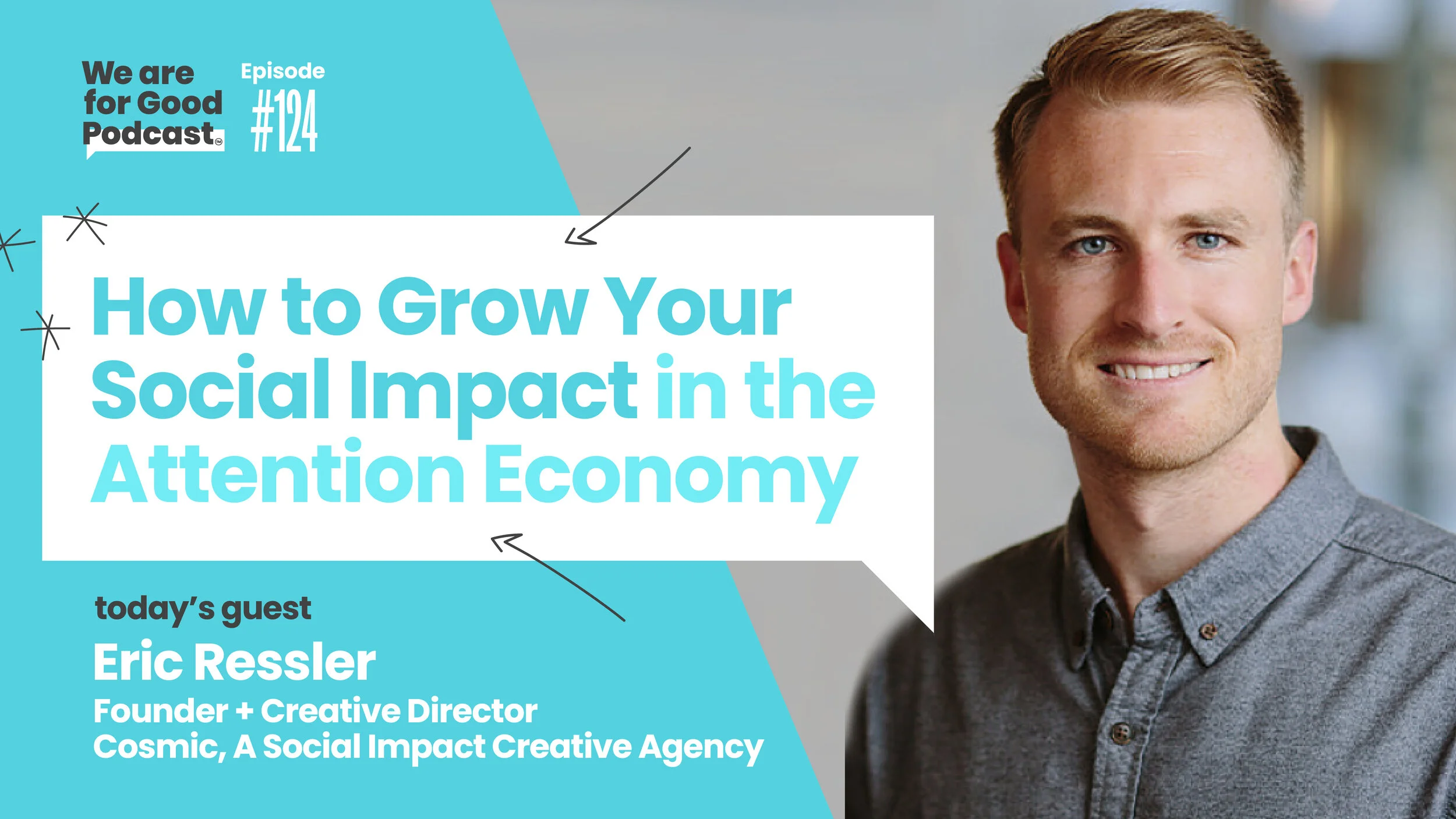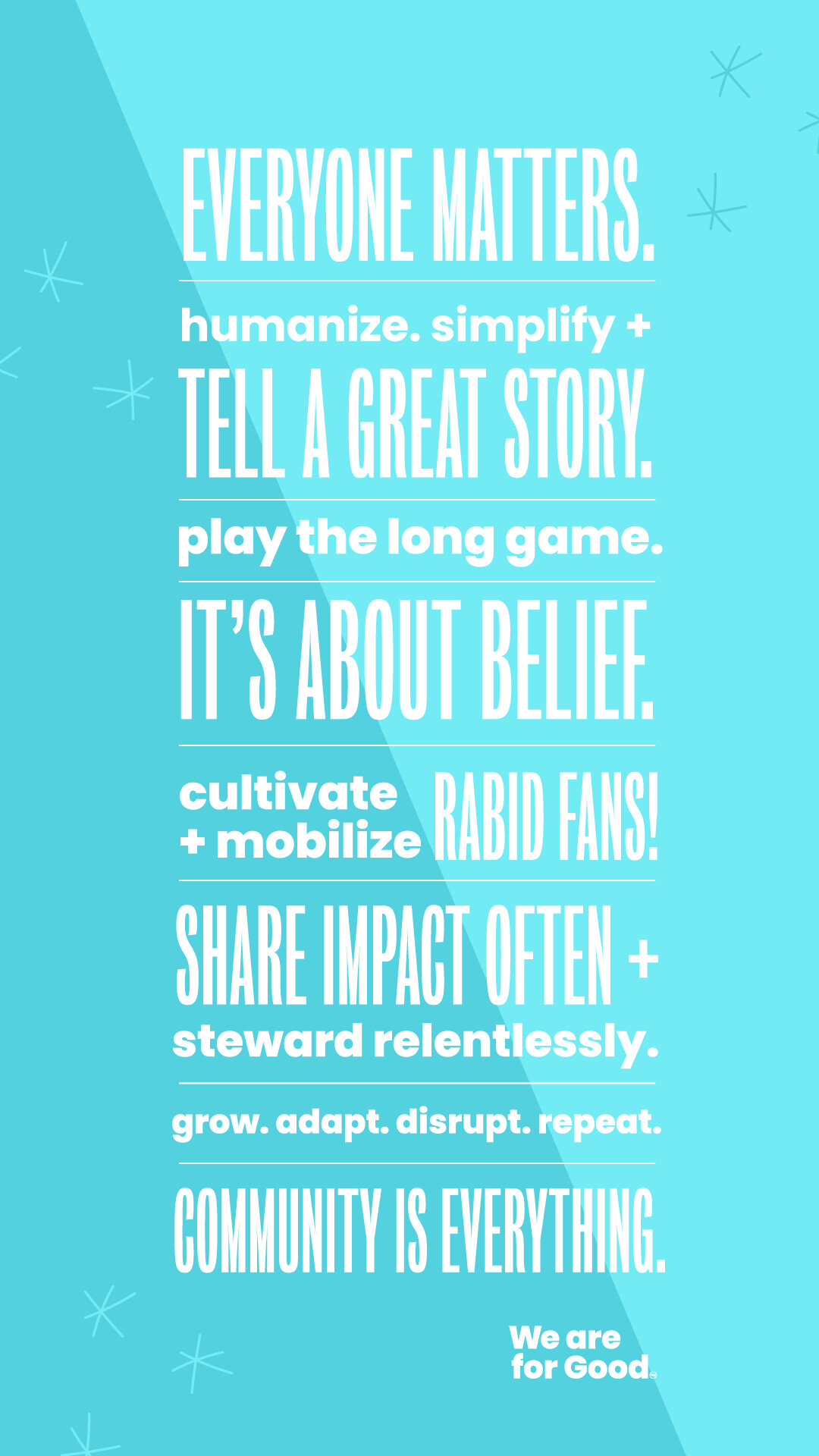124. How to Grow Your Social Impact in the Attention Economy - Eric Ressler
Listen to this episode
Overview
Meet Eric. This musician chased his passion for doing good, telling a compelling story and weaving it all together through brilliant creative into building Cosmic, a Social Impact Creative Agency. He's talking us through how to build a Digital Media Platform to promote your cause and stepping us through the Engagement Pyramid. He's also talking through vision statements, and we're trying not to maintain our composure and refrain from drooling all over Cosmic's heart-stirring manifesto. If you're looking for an incredible digital storytelling episode, this one is your jam.
Today’s Guest
Eric Ressler, Founder & Creative Director, Design by Cosmic
“We like a mission statement to be something that you can actually do in three years. You can track against and actually measure it, and at the end of those three years, you either met your mission or you didn’t. Oftentimes, mission statements are much loftier and you know much more about values and ideas. To us, that’s your vision statement. That’s your vision for the better future.”
Episode Transcript
Download Full Episode Transcript Here
Episode Highlights
Eric’s story and journey to where he is today (2:30)
The digital revolution (7:20)
How organizations can move to become a brand that people love (10:00)
Focus on your unique niche (11:00)
Eric’s advice for where to begin (13:30)
Elevating the conversation and building a platform (19:00)
Planting seeds and working for a better future (24:00)
Eric’s opinion on mission and vision statements (26:00)
The engagement pyramid (28:29)
A powerful moment of philanthropy in Eric’s life (31:00)
Eric’s One Good Thing: Be curious.
Powerful quotes
“It's this incremental, natural evolution, all the technological innovation that's happened over the last decade.” -Eric
“We live in this in this space in this experience, where information is free and flowing and overwhelming.” -Eric
“The scarcity is no longer access to information for a lot of people. The new scarcity is people’s attention.” -Eric
“Once you get people engaged, you have to inspire them to actually take action. And all of this happens primarily through digital channels these days.” -Eric
“A lot of nonprofits and social impact organizations are still playing the old game, they're still doing things in the old paradigm, and they don't have strong digital first culture built out within their organizations. That's really the large shift that needs to be made in order to really play in this new attention economy.” -Eric
“If you’re trying to say everything to everyone, you end up saying nothing to no one.” -Eric
“The nonprofit sector is this third sector that's come in to try and solve these really difficult issues. And then they're under resourced and they don't have enough capacity to really do it. There are a lot of barriers.” -Eric
“At the end of the day, you want to come back to your unique strengths and what you really believe in, and the thing that you really want to spend your time doing as an organization.” -Eric
“Oftentimes these issues and vision statements are so lofty and complex. At the end of the day, if you really distill it down to its core, all these organizations have some kind of idea around a better version of the future. Really their only job is to convince enough people in the world, that that idea of the future is a good one, and then inspire and activate them to help make it happen.” -Eric
“Some of the best things that have ever happened, are because people have come together, sharing a vision of a better vision, a vision of the future, and figuring out how to make it happen.” -Eric
“When we start to draw strengths from a broad and diverse set of people, everyone can bring their own individual strengths to the issue. Then collectively, we can create action at a much greater scale than we'd be able to otherwise.” -Eric
“We like a mission statement to be something that you can actually do in three years. You can track against and actually measure, and at the end of those three years, you either met your mission or you didn't. Oftentimes, mission statements are much loftier and you know much more about values and ideas. And those things are important too. But to us, that's your vision statement. That's your vision for the better future.” -Eric
“Curiosity is the antidote to apathy. It keeps you moving forward, keeps you learning, and it keeps you in a state of openness instead of closed.” -Eric
Becoming a Brand That People Love
1. Have a very clear mission, vision, and niche.
Within the social impact ecosystem, we need to carve out our niches and agency. These nonprofit organizations need to carve out their niche within their area of focus. There's a distinction between what would be called “positioning” in the business world and carving out your niche and the ecosystem and the social impact space. That difference is you're not really competing in the same way for customers. If you're working towards an issue that people care about, it's really more of a synergistic partnership with other players in the space who are working towards the same issues.
2. Discover your unique niche.
Ask yourself: what is our niche? What are our unique strengths that only we can bring to this issue that other organizations can't? If you start with that, everything else can flow naturally from that. If you don't do the hard work of really clearly carving out your niche, and saying no to things and saying yes to other things, then it's really hard to do the rest of it well, because you start to create these really broad muddy stories. A story needs to be concise and clear to be effective. If you’re trying to say everything to everyone, you end up saying nothing to no one.
3. Start a conversation.
Ask some key stakeholders within your organization to write down a stream of consciousness response to a prompt, like, “what are the unique strengths that we bring to our sector, like or to our issue or our area of focus?” That’s really where niche begins. You really have to do the hard work and sit down and figure out, what's the part that we're going to bring to the table and focus all your efforts on that. Because that's when you can actually truly make an impact
Becoming a Digital Media Platform
Your website is the core.
You basically are building a machine. If you think of the machine as a flywheel, your core website is the hub of that flywheel. And then you need all kinds of different pieces of content and communication that essentially are all trying to drive people back to that core website.
👉 One of the biggest mistakes that we see nonprofits make is they make their website about themselves. Your website needs to be about your community and how they can help and how they can become activated.
Pillar 1 : Content
Create ongoing, authentic, interesting, engaging, and oftentimes, a couple times a year scroll, stopping content that can like really capture people's attention, continue to engage them, give them reasons to come back to the site to interact with your brand, to become part of the community and help kind of move the story along.
Pillar 2 : Technology
There's all kinds of technology that needs to be set up to make sure that that's all integrated and working in a way that allows you as the organization to identify people who are engaged and give them opportunities to act. Oftentimes there's these disparate systems, there's stuff happening on social, there's stuff happening on email, there's stuff happening on the website, but there's no integrated CRM or donor engagement platform that allows the people within the organization to understand what's working, and what's not working. You must get an idea at a per user level, how they're interacting with your content, how they're engaging with your organization, and what opportunities there are to move them up this thing that we call the engagement pyramid.
Pillar 3 : Culture
There's a need for organizations to build out a strong internal digital first culture. What does that mean? It means that your digital and your brand gets the same amount of attention as your program work because it is your program work. This is how you engage people, and oftentimes it gets thought of as this marketing costs. We want to flip that on its head and show organizations that this is actually where you should start. When you start with that in mind, you start to see this upward spiral happen. You get more engagement, donations, and more people showing up inspired and activated. That leads to the ability for this upward spiral to start to form and then you start to actually make an impact.
The Engagement Pyramid
1. Unaware
2. Aware
3. Engaged
4. Activated
5. Leadership
Connect With Eric and Cosmic
LinkedIn / Website / Manifesto / Email
Join the Good Community!
The We are for good community
This is a safe place for deeper conversations. While we love this podcast, it is a very one-sided dialogue. It is great for starting conversations, but not continuing them. You can find friends, colleagues, and others to champion alongside. We believe community is everything and we wanted to create a place where people could learn and thrive and grow together (and also have a whole lot of fun).
Episode Sponsored by
Watch a clip of this episode
Share this episode
Photoshopped Selfie with Eric! (Oops! the real one didn’t turn out quite right - see below!)
Jonathan McCoy, CFRE, Eric Ressler, Julie Confer and Becky Endicott, CFRE
124 episodes down, we are still working on how to use the timer photo function on our phones! ;)













